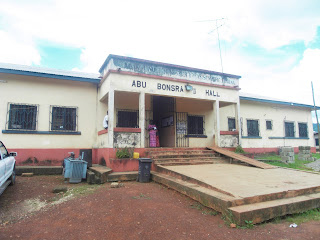More on Susu and Microfinanace....yes we can
We at The Jedidiah Trust are going to reprint a series of notable articles on our microfinance and Susu to let our friends know how important and essential this aspect of our NGO is we will also be launching our pilot scheme in the Adansi North District in December so watch out for pictures. Thank you and enjoy the article.
Susu Collection – The Ancient Version of Micro-Savings
by Fehmeen Ahmed, the founder of the Microfinance Hub Blog.
The term Bottom of the Pyramid should be synonymous to the word ‘resourcefulness’ because of all population segments, this group cannot afford to be otherwise. Low income groups are compelled by the paucity of assets and limited access to financial services to create viable solutions that serve their needs.
An example of such ingenuity is the ‘susu collection’ service which is an ancient banking system in Ghana, worth USD 160 million. The model resembles microfinance in several ways; susu collectors (equivalent of loan officers) roam villages and rural communities to collect savings (micro-savings) and sometimes offer credit against these savings (microcredit). The susu collector is expected to manage the “mobile mini-bank” on his/her own with integrity and honestly.
There are currently around 4,000 susu collectors in Ghana and each one of them serves between 400 and 1,500 customers daily. Clearly, this is a lot of work, especially since the service may vary according to each community’s needs and asset level. For instance, low-income groups can deposit small amounts of money (up to USD 2.5) with the susu collector on a daily basis and the aggregated money can redeemed at the end of the month. Slightly better off individuals form a rotating savings group, where aggregate savings are handed over to one group member in each period (which is one ofmany microfinance models).
The service is vital, to say the least. Micro-savings not only offer the safe storage of scarce funds, they also help lessen the financial volatility of the poor, who lead lives marked with financial unpredictability. At the same time, microcredit offers the poor a chance to easily start their own income generating activities.
Since the business falls in the informal sector, there are certain advantages (no bureaucracy, good outreach, intimate understanding of client needs, etc.) and disadvantages (fraud, fund mismanagement, improper assessment of credit risk, theft of funds, high interest rates on microloan, etc.). Two notable initiatives have been taken to address these concerns:
- The Ghana Cooperative Susu Collectors Association was setup and is pushing for a government policy to formalize the susu collection system which will minimize fraud and make it possible to integrate susu collectors with the microfinance sector (where interest rates are monitored and interest is paid on savings),
- Barclays Bank in Ghana offers bank accounts where susu collectors can safely store funds and offers basic financial training to them.
Despite its problems, the susu collection system is remarkable and linking it to the formal financial sector will add synergy to the Ghana’s financial inclusion efforts.



Comments
Post a Comment